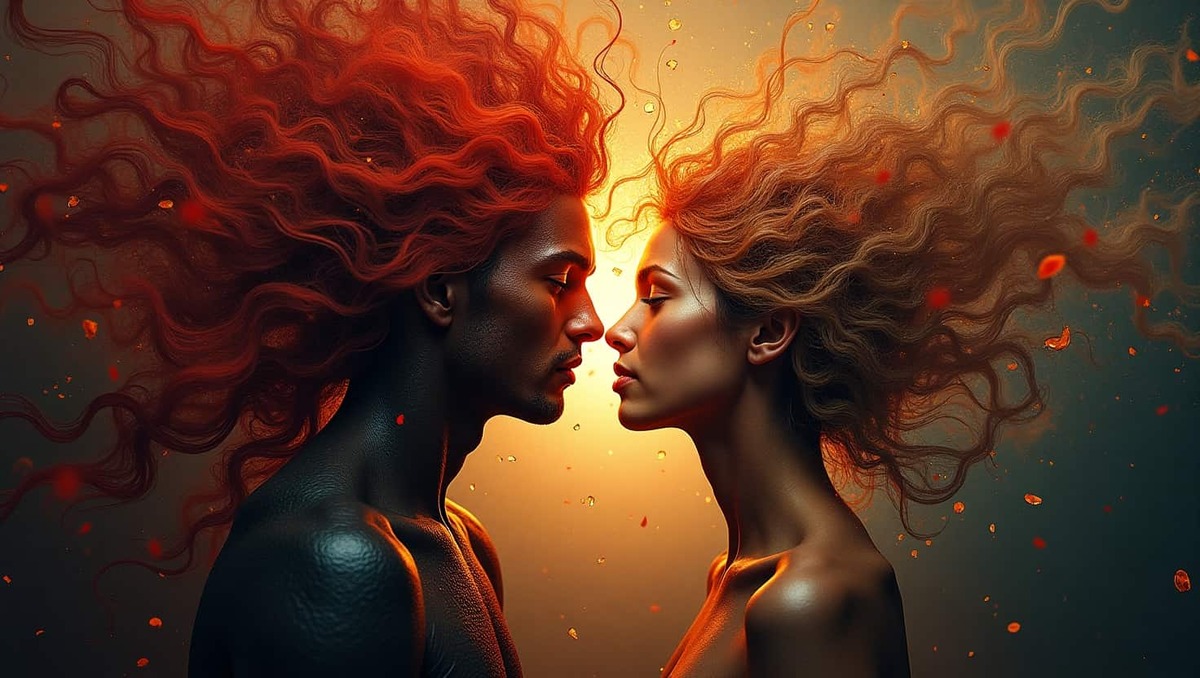“Erothtos” is the deep connection I have experienced in meaningful relationships where love goes beyond the surface and combines passion, vulnerability and authenticity. By accepting this bond, I have developed a deeper understanding of true intimacy and the beauty of genuine connection.
“Erothtos” represents a deep and complex emotional experience of connection that goes beyond traditional love and encompasses longing, desire and beauty. It is about building deep and meaningful human bonds that go beyond the superficial.
We will discover the complexity of “Erothtos” and its profound influence on interpersonal relationships. From history to modern psychology, we will shed light on how this feeling shapes relationships and intimacy.
What is Erothtos?
“Erothtos” represents deep and complex emotions that make up human relationships. The term originates from ancient languages and denotes an emotional passion that goes beyond the typical categories of love and includes longing, desire, and beauty.
Unlike simple romantic affection, “Erothtos” is a complex experience that highlights the deep nature of human relationships.
In today’s fast-paced digital world, the term “Erothtos” serves as a reminder of the deep connections people can form.
Go beyond superficial interactions and explore the nuances of intimacy.
This article explores the origins of the term “Erothtos,” its historical development, and its relevance in contemporary culture, philosophy, and psychology.
What are the ancient roots of the term Erothtos?
Ancient Origins of the Term Erothtos
Ancient Origins of the Term Erothtos: The term “Erothtos” dates back to Greek and Roman culture, where love was a multi-layered concept that went beyond simple attraction. It represented emotional, intellectual and spiritual connections and emphasized a holistic sense of connection.
The Concept of Erothtus in Mythology and Ancient Culture
The Concept of Erothtus in Mythology and Ancient Culture: Greek myths featuring figures such as Eros and Aphrodite illuminated the complexity of love, thereby highlighting the bittersweet nature of longing.
Roman poets such as Ovid explored love, loss and the tension between desire and satisfaction, thus forming the basis of today’s “Erothtus”.
The Philosophy of Erothtus: Exploring the Depths of Love Beyond Romance
Philosophical Foundations of Erothtus
The concept of “Erothtus” has its roots in classical philosophy, particularly the works of Plato and Aristotle, where love is viewed as more than just physical attraction. Plato viewed love as a search for truth and beauty, while Aristotle linked it to human flourishing and mutual respect.
Together, they expand “erothtos” beyond romantic love to encompass emotional, intellectual, and spiritual satisfaction.
Existential and Contemporary Perspectives
The concept of “erothtos” developed with modern existential philosophers such as Sartre and Kierkegaard, who viewed love as a paradoxical force that both liberates and constrains.
Emphasizing the ephemerality of this language, contemporary thinkers believe that “erothtos” is about self-discovery as well as emotional connection. Accepting vulnerability and authentic expression helps build deeper and more meaningful connections.
Also Read: HopTraveler.com: Your Ultimate Travel Companion
How was Erothtus portrayed in literature and art?
Literary representations of Erothtus:
In ancient literature, writers such as Homer and Sappho addressed themes such as longing and unrequited love. Homer’s Iliad and Odyssey describe the agony of passion and the complexity of human relationships.
In the Middle Ages, love was portrayed from a spiritual perspective in Dante Alighieri’s Divine Comedy, particularly in the portrayal of Beatrice, in which “Erothtus” is reflected as a transcendent divine force.
Modern writers such as Gabriel García Márquez (“Love in the Time of Cholera”) and Milan Kundera (“The Unbearable Lightness of Being”) continued to explore the complexity of love, blending passion with philosophical depth and offering dynamic interpretations of “Erothtus”.
The Role of Art in the Expression of Eroticism
From the sculptures of ancient Greece to the masterpieces of the Renaissance, art has always been a medium for expressing love and passion. Botticelli’s “The Birth of Venus” and Titian’s “Venus of Urbino” explore beauty, desire, and emotional depth.
These works demonstrate that “erottos” is not just an aesthetic experience, but a profound emotional journey into the core of human existence.
Also Read: NWBKA King Roses: A Complete Guide
The Cultural Meaning of Erothtos: Exploring Global Perspectives on Love and Connection
Eastern and Western Conceptions of Eroticism
Western culture places value on individual attachment and romantic love, often idealizing and romanticizing it.
Eastern philosophies such as Buddhism and Taoism view love as a force of balance and harmony, and believe it should be experienced with equanimity rather than clinging to it.
Despite cultural differences, the concept of “erothtos” remains a universal experience, with Western thought emphasizing personal connection and Eastern thought linking love to spiritual growth and personal transformation.
Worldwide Celebrations of Passion
From the lavish love celebrations of Western festivals like Valentine’s Day to more spiritual celebrations like the Qixi Festival in China, “erottos” manifests itself in different ways in different cultures.
These celebrations highlight the personal and universal nature of connection and remind us of shared emotional experiences that cross cultural boundaries.
Erothtos and Modern Psychology: Decoding the Emotional Underpinnings of Human Relationships
The Science Behind Erottos
Modern psychology has discovered a lot about how emotional connections affect the brain and our behavior. The concept of “erothtos” is consistent with many psychological theories about attachment, emotional intelligence, and the power of empathy.
Attachment theory, for example, posits that early attachments to caregivers influence how we connect with others throughout our lives. The feelings associated with “erothtos” (longing, affection, and deep connection) are deeply rooted in our psychological development.
Emotional Intelligence and Erothtos
Today, psychologists emphasize the importance of emotional intelligence (EI) in forming healthy and meaningful relationships.
“Erothtos” as an emotional state encourages people to be self-aware, show compassion for others, and communicate openly. All of these things are essential for building strong, lasting relationships.
Read also: The Cuban Ambassador to the Holy See in 1935: a comprehensive historical overview
Eroticism in the media: exploring love and connection in film and the digital age
Eroticism in Movies and TV Shows
The portrayal of love and connection in movies and TV shows is constantly evolving. Eroticism is explored in all types of movies, from romantic comedies to serious dramas. Movies like
The Notebook and Titanic portray the depth and complexity of love, while other films like Her explore the emotional complexities of human connections in the digital age.
Social Media and the Changing Nature of Connection
Social media has changed the way we form emotional connections. Platforms like Instagram and Facebook offer a new dimension of eroticism, as it is where people share not only their lives but also their emotional experiences.
However, the digital age also challenges the authenticity of emotional connections and raises questions about the true depth of online connections.
How can eroticism shape our relationships and foster deeper connections?
Building Authentic Connections
To capture the essence of eroticism, people need to focus on authentic communication, vulnerability, and emotional transparency. These elements are vital to cultivating meaningful relationships that go beyond superficial interactions.
Practices to Adopt the Erothtos
Active Listening: Listening carefully to someone is the first step to building an emotional connection.
Self-Reflection: Regular journaling or meditation can help you better understand your own feelings.
Vulnerability: Talking openly about feelings fosters trust and emotional intimacy.
Also Read: make1m.com – The Ultimate Guide
Conclusion: The Lasting Legacy of Erothtos
“Erothtos” represents more than just romantic affection; it is the essence of all human connections and combines emotional, intellectual, and spiritual elements. By understanding and embracing “erothtos,” people can deepen their relationships, improve their emotional intelligence, and cultivate more meaningful connections in their lives.
Frequently Asked Questions
1. What does “erothtos” mean?
“Erothtos” refers to a deep and complex emotional state that embodies passion, longing, and connection and goes beyond simple romantic love.
2. How can I apply the concept of “erothtos” to my personal relationships?
By focusing on authenticity, vulnerability, and emotional transparency, I can improve my relationships and build deeper connections.
3. Is “erothtos” the same as “eros”?
While “eros” refers specifically to romantic love, “erothtos” encompasses a broader range of emotional experiences, including passion, longing, and emotional connection.
4. How has “erothtos” evolved in philosophy?
From Plato’s search for truth and beauty to contemporary visions of self-discovery and vulnerability, Erothtus has evolved into a multi-layered emotional experience.
5. What role does Erothtus play in modern psychology?
Erothtus is consistent with attachment theory and emotional intelligence, emphasizing the deep connections that emerge through empathy, self-awareness, and emotional connection.











